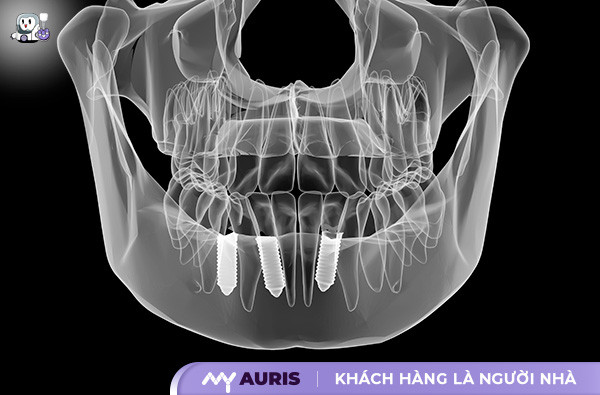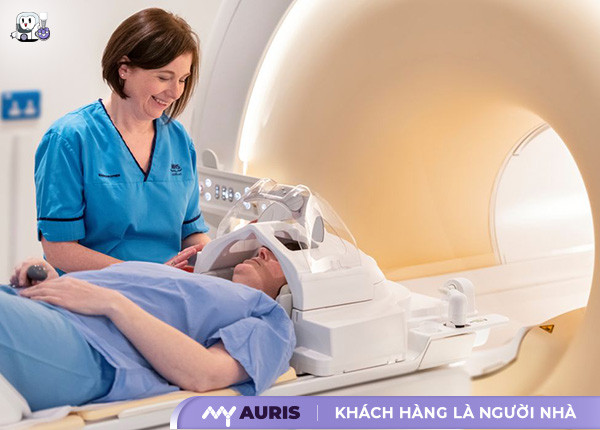During a standard MRI scan, patients are required to avoid carrying metal objects. This raises concerns about whether dental implants are compatible with MRI scans and what factors need to be considered to ensure safety. My Auris will provide detailed information on this topic, helping you feel more at ease about your oral health when undergoing an MRI scan.
What is MRI?
Magnetic Resonance Imaging (MRI) is a modern cross-sectional imaging technique that operates using magnetic fields and radio waves. When the body is placed in a strong magnetic field, hydrogen atoms in body tissues absorb and then release RF (radio frequency) energy. This process generates signals, which are then processed by a computer system to construct MRI images with high sharpness, contrast, and clear detail down to the smallest structures in the body.
A key feature of MRI is its 3D reconstruction capability, allowing doctors to view anatomical structures from multiple angles, thereby diagnosing pathologies more comprehensively and accurately. Numerous studies have shown that, in many cases, MRI results significantly surpass ultrasound, X-ray, or CT scans in terms of image quality and diagnostic effectiveness.
Beyond its outstanding imaging capabilities, MRI also stands out for its safety, as it uses absolutely no radiation. This is particularly important for patients requiring repeat scans or sensitive groups such as pregnant women and children. Therefore, MRI is considered a preferred option by specialists for many imaging indications.

Why is it Necessary to Remove Metal Objects Before an MRI Scan?
During an MRI scan, it is mandatory to remove metal objects from the body. This is because the superconducting magnet system in the MRI machine generates a strong magnetic field, which can interact with metal. This can easily lead to magnetic field disturbances, distorting MRI images and affecting diagnostic accuracy.
Furthermore, some ferromagnetic materials can be pulled or moved by the magnetic force, posing a potential risk of injury to nearby organs. Therefore, before the scan, patients must remove all metal from their person, including jewelry, accessories, and even medical devices containing metal.
Can You Get an MRI Scan with Dental Implants?
One common concern today is: Can you get an MRI scan with dental implants? The answer is absolutely yes, and patients do not need to be overly concerned about potential health risks or impacts on imaging results.
In fact, most objects have a certain degree of magnetism, classified as: ferromagnetic, antiferromagnetic, paramagnetic, diamagnetic, etc. Among these, paramagnetic materials have very weak magnetism, reacting only slightly when placed in a strong magnetic field, such as that of an MRI scanner.
For the metal post in dental implants, the main component is usually Titanium – a durable, lightweight biomaterial with virtually zero magnetism. Titanium is classified as a paramagnetic material, meaning it is not affected by strong magnetic fields like those from an MRI machine, nor does it cause magnetic field interference during the scan.

Cases Where MRI Scans Are Not Possible with Dental Implants
During the dental implant placement process, there are cases where careful consideration is needed before undergoing an MRI (Magnetic Resonance Imaging) scan. A standard implant typically consists of three parts: the implant post embedded in the jawbone, the abutment connector, and the prosthetic crown on top. Both the post and the abutment are usually made from Titanium, a safe material that does not cause interference during an MRI.
However, the notable point lies in the crown – this part can be fabricated from various materials such as porcelain, resin, or metal. If you have an all-ceramic crown, an MRI scan is completely safe, and there’s no need to remove the implant. This is why, in modern dentistry, doctors often recommend all-ceramic restorations for convenience if an MRI is needed in the future.
Conversely, if the crown is made of metal, porcelain-fused-to-metal, or a titanium alloy with a low titanium content, the crown must be removed before an MRI scan. Although the crown removal procedure is not overly complicated, it can be inconvenient and time-consuming for the patient.

What You Need to Know Before Getting Dental Implants to Ensure Safety and Effectiveness
Dental implant placement is a modern tooth restoration method that helps rebuild missing teeth by surgically placing an implant post into the jawbone. However, to achieve optimal results and ensure safety, patients must strictly adhere to the specialist’s instructions.
One indispensable step before dental implant placement is a full-arch CT scan. This helps the dentist accurately assess the condition of the maxillary sinuses, jawbone density, and specifically identify the area of missing teeth. In cases of long-term tooth loss leading to bone resorption, the dentist may recommend sinus lifting and bone grafting to create a solid foundation for the implant post.
Additionally, a general health check-up also plays an important role. Patients need to ensure they are not in contraindicated situations, such as having cardiovascular disease, uncontrolled high blood pressure, or having previously undergone radiation therapy to the jawbone area. Specifically, if suffering from oral diseases like gingivitis or periodontitis, these must be thoroughly treated before the procedure.
Furthermore, blood pressure control before surgery is also a crucial factor to minimize risks and ensure safety throughout the dental implant process.
Regarding the common question, ‘Can you get an MRI scan with dental implants?’, the answer is that you need to inform your doctor beforehand for appropriate handling, as the metal implant post can potentially affect MRI images.





